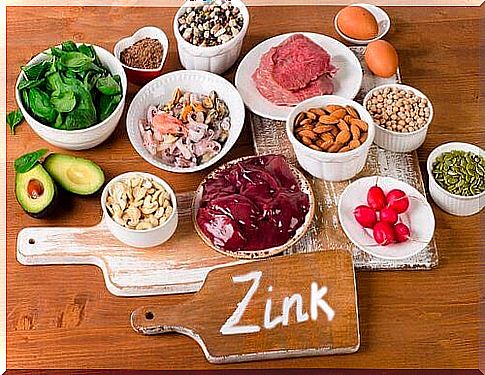Depression Due To Deficiency Of 6 Nutrients

Depression is a mood disorder. These are some of the characteristics: a constant feeling of sadness, annoyance and a general loss of interest in daily activities and in life. But did you also know that depression can arise as a result of a shortage of certain nutrients?
Depression is fairly common, especially in developed countries. Today it is even considered a public health condition.
For many years it was assumed that depression was caused only by an emotional situation.
But over time, it has been found to be due to changes in brain chemistry. Heredity, environmental factors and hormonal changes can lead to this condition.
In addition, it was discovered that dietary habits play a major role in the development of depression. After all, a deficiency of certain nutrients increases the chance that this problem will occur.
That is why it is essential that you follow a better diet. So we need to eat more foods that can help us avoid and fight this condition.
In this article, we present six nutritional deficiencies that are linked to the development of depression.
So be sure to read on. Find out which nutrients you need to avoid problems with this condition!

Foods rich in omega-3 fatty acids are a source of many different positive elements for the body. This also applies to emotional health.
Because the absorption of these nutrients plays a key role in the development and functioning of the central nervous system. That’s because they control inflammation. At the same time, they regulate the activity of the nervous system.
Omega 3 fatty acids are also essential to balance the distribution of chemical constituents in the brain. In addition, they reduce the risk of premature aging.
This nutrient is also recommended as part of treatment for depression. Because it increases the production of serotonin. It also reduces any excessive presence of cortisol.
You can get this effect by eating the following foods:
- Fatty fish
- Seeds and nuts
- Legumes and beans
- Eggs
- Vegetables
A lack of vitamin D will not only increase the risk of problems with the bones and joints. It can also cause periods of depression and dementia.
Because this vitamin is the key to serotonin. This is a neurotransmitter that plays a role in the mood and feeling of happiness.
Correct absorption of this vitamin therefore reduces the risk of all kinds of emotional imbalance. It also has positive effects on the immune system.
The easiest way to absorb vitamin D is through sunlight. So go for a walk outside. But you can also find this vitamin in the following foods:
- Fatty fish species
- cod oil
- Grains and fortified soy products
- Dairy products
- Eggs
- mushrooms

Zinc is yet another nutrient that plays a role in regulating emotions. Because this component stimulates some neurological functions and the activity of the nervous system.
Absorb the appropriate amount of zinc into the body. Then it will increase the production of neurotransmitters that promote your general well-being.
At the same time, zinc is also involved in more than two hundred and fifty independent biochemical jobs. They determine the function of the main organs.
To tackle a zinc deficiency, we suggest you eat the following foods more often:
- Red meat
- Eggs
- Seafood
- legumes
- nuts
- Seeds
- Whole grains
- Organic dairy products
This nutrient is necessary for the functioning of the brain. It also keeps the mood stable.
Selenium plays an important role in the functioning of the thyroid gland. At the same time, it is of great importance for mental health.
It possesses antioxidant and restorative properties. As a result of these effects, it plays a key role in preventing and treating depression.
These are some sources of selenium:
- Lean meat
- Oily fish (sardines, salmon, etc.)
- Beans and peas
- Eggs
- Seafood

Unfortunately, magnesium has a disadvantageous property. After all, it is one of the minerals that the body is very difficult to absorb.
But in the treatment of depression it plays a fundamental role. Because it increases the production of serotonin and dopamine. In addition, it lowers the production of cortisol.
Magnesium is found in the following foods:
- Seaweed
- Almonds
- Avocados
- bananas
- beans
- pumpkin seeds
- Whole grains
- Bran
- Green leafy vegetables
Iron deficiency is one of the main causes of anemia as well as mental fatigue and depression.
It is important to know that iron is an indispensable component for cognitive functions and development. In addition, it plays an important role in the functioning of the senses and muscles.
We recommend the following foods to increase the amount of iron in your body:
- Red meat
- Beetroot
- Fatty fish
- Oatmeal
- Spinach and other vegetables
- Pomegranate
- Eggs
- beans
- peanut butter
So what you should especially remember is what effects a deficiency of the listed nutrients can have. After all, they play a key role in treating depression and negative moods.
However, it will always be necessary to examine other factors as well. Because this will make it possible to determine what exactly is the cause of the condition. An examination of all factors is also necessary to determine which measures should be taken.









